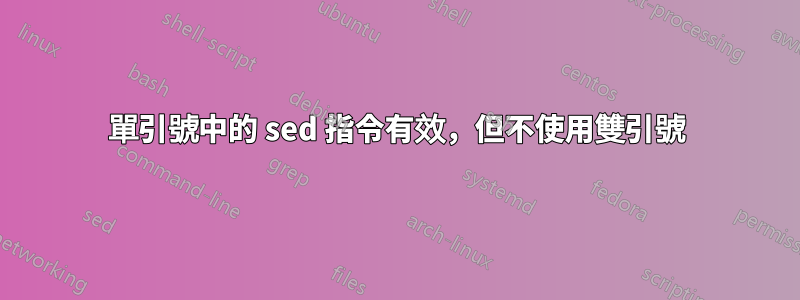
我使用的是 Ubuntu 16.04,鑑於以下test.file內容:
Hello \there
為什麼會這樣(從命令列):
sed 's#\\there#where#' test.file
工作,但是這個:
sed "s#\\there#where#" test.file
才不是?是配置的問題嗎?
前者成功替換了模式,而後者似乎沒有找到任何匹配。
我需要在腳本中的替換文字中使用變量,所以我(我猜我)需要在 sed 命令兩邊加上雙引號。
答案1
在bash其他 shell 中,單引號或雙引號內的反斜線字元的處理方式有所不同。
當您鍵入 時sed 's#\\there#where#' test.file,sed在其運行字串中看到的是s#\\there#where# test.file,因為單引號會阻止所有特殊字元和轉義序列解釋:甚至\'不允許。
當您鍵入 時sed "s#\\there#where#" test.file,sed在其運行字串中看到的是s#\there#where# test.file,因為雙引號允許一些轉義序列,並且 shell 已將第一個反斜杠解釋為轉義第二個反斜杠。
更複雜的是,sed還允許轉義序列解釋,類似於雙引號中的轉義序列解釋,因此在第一種情況(單引號)中,搜尋字串變為\there,如您所願;而在第二種情況(雙引號)中,搜尋字串的第一個字元變為Tab,後面接著here。
以下手冊摘錄bash定義了這些操作:-
There are three quoting mechanisms: the escape character, single quotes, and double quotes. A non-quoted backslash (\) is the escape character. It preserves the literal value of the next character that follows, with the exception of <newline>. If a \<newline> pair appears, and the backslash is not itself quoted, the \<newline> is treated as a line continuation (that is, it is removed from the input stream and effectively ignored). Enclosing characters in single quotes preserves the literal value of each character within the quotes. A sin‐ gle quote may not occur between single quotes, even when preceded by a backslash. Enclosing characters in double quotes preserves the literal value of all characters within the quotes, with the exception of $, `, \, and, when history expansion is enabled, !. The characters $ and ` retain their spe‐ cial meaning within double quotes. The backslash retains its special meaning only when followed by one of the following characters: $, `, ", \, or <newline>. A double quote may be quoted within double quotes by preced‐ ing it with a backslash. If enabled, history expansion will be performed unless an ! appearing in double quotes is escaped using a backslash. The backslash preceding the ! is not removed. The special parameters * and @ have special meaning when in double quotes (see PARAMETERS below). Words of the form $'string' are treated specially. The word expands to string, with backslash-escaped charac‐ ters replaced as specified by the ANSI C standard. Backslash escape sequences, if present, are decoded as follows: \a alert (bell) \b backspace \e \E an escape character \f form feed \n new line \r carriage return \t horizontal tab \v vertical tab \\ backslash \' single quote \" double quote \nnn the eight-bit character whose value is the octal value nnn (one to three digits) \xHH the eight-bit character whose value is the hexadecimal value HH (one or two hex digits) \uHHHH the Unicode (ISO/IEC 10646) character whose value is the hexadecimal value HHHH (one to four hex digits) \UHHHHHHHH the Unicode (ISO/IEC 10646) character whose value is the hexadecimal value HHHHHHHH (one to eight hex digits) \cx a control-x character The expanded result is single-quoted, as if the dollar sign had not been present. A double-quoted string preceded by a dollar sign ($"string") will cause the string to be translated according to the current locale. If the current locale is C or POSIX, the dollar sign is ignored. If the string is translated and replaced, the replacement is double-quoted.


